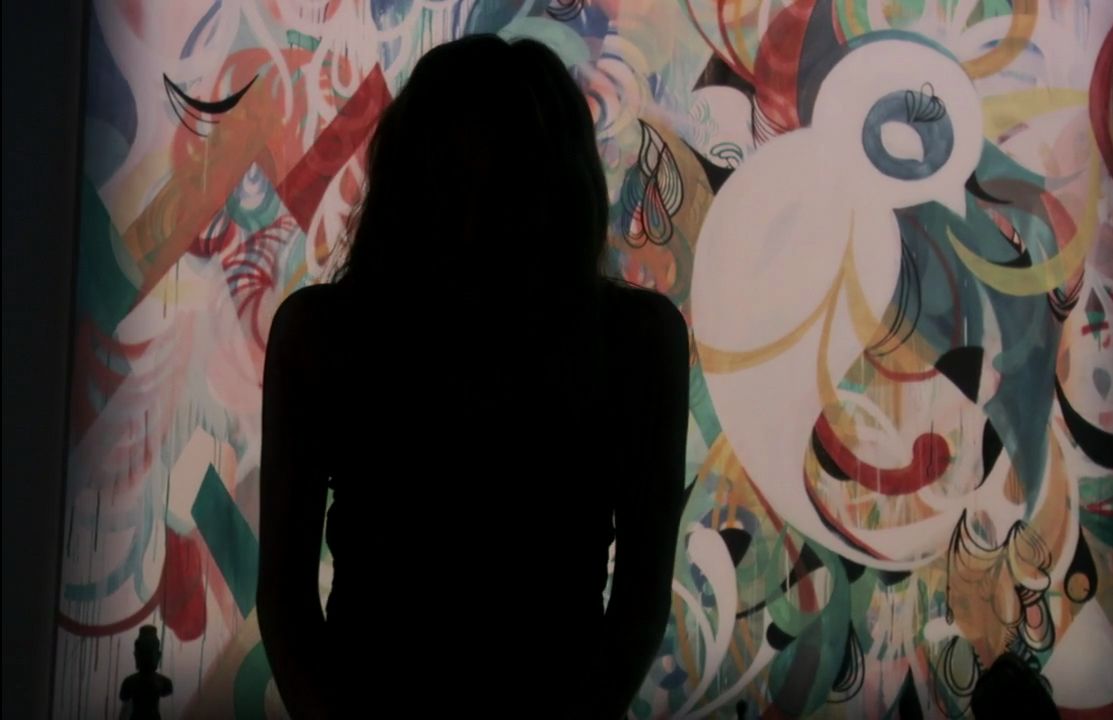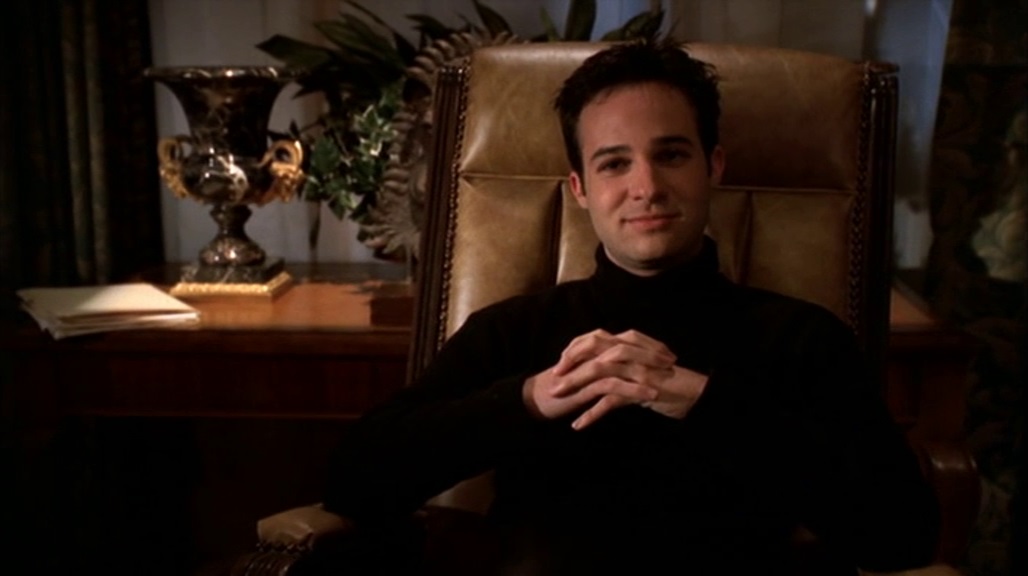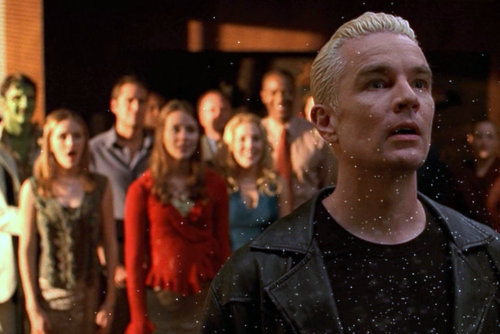Final seasons are very hard to do. When you have a show that has run for a few seasons, all of that accumulation of story leads to threads that feel like they need to be tied up. With so many different masters to serve, results are often mixed at best. One way to do it is The Sopranos way. Its final season is one that largely abandons traditional plot in favor of drifting in a fog of overwhelming malaise, giving off the feeling that everything is coming to an end not with a bang, but a whimper. Yet it could only get away with this because it was a show that never really cared about plot in the first place, preferring to deal in anticlimaxes and slow deflation. The final season of The Sopranos will come up alot in this post, not only because it was split into two parts much in the way that Breaking Bad's was, but also because by bucking the usual trends of what we expect from a final season of television, it manages to be a major success.
Then there's the Breaking Bad way of doing a final season. Breaking Bad is another show that benefits from having its construction be tailored in a way that suits a relatively mess-free conclusion. Throughout its 5 season run, it remained so laser-focused that it never grew to an unwieldy size in the way that many other shows do. It also wasn't a show that was very heavy on mythology, so there weren't any real notions of needing to "answer questions," like fans demanded of Lost and Battlestar Galactica. By the time season 5b (which is what we'll use to denote the split halves of season 5, in true Sopranos fashion) rolled around, the show had mostly cleared all of the pieces off the board, leaving behind only the necessary players for the endgame.
That's an apt metaphor to make, since much of the beginning of 5b felt like an intricate game of chess between Hank and Walt. Each of them are smart, prideful, determined men hellbent on winning, and watching them make moves to try to get a leg up on one another was a jolt to the early stages of the season. It's some of the ballsiest storytelling that the show has ever done, making decisions in one episode where other shows would take four. Though Hank tries to play a slow game when he first has the revelation that his brother-in-law is the infamous Heisenberg, Walt forces his hand, setting off the explosive confrontation between the two of them in Hank's garage. From there, you them both lining up their pieces, with Hank trying to approach Skyler, Walt taping a confession that implicates Hank, and Hank getting Jesse on his side. It's kind of crazy how far away all of that starts to feel, as it begins another passage around the time of Hank's death, both in terms of plot and tone.
I consider myself an agnostic person heavily leaning towards atheism, but for some reason, I really love shows that explore the idea of God in a very abstract sense, usually in the form of souls. The Sopranos' final season was all about the loss of one's soul in a way. The entire season was littered with moments of the show walking characters to the edge and asking them if they want to step back or dive into the black, and it's made all the more compelling because they're so unaware of this. It's never explicitly said, but it's clear that there is a reckoning hovering just out of view. Similarly, there is no mention of God in Breaking Bad, but it exists in a world that's clearly guided by the hand of some moral judge. Just take a look at the plane crash at the end of season 2. It's a moment that I don't love -- I feel like it goes out of its way just to make a thematic point -- but the point is one that reverberates throughout the series. Actions have consequences, and the final season specifically hammered down on that idea. The question was never whether Walt had lost his soul -- that's a given. But would he ever become aware of it? That very question is what makes "Ozymandias" such a magnificent episode -- it's the beginning of Walt truly understanding what he has wrought. Hank is dead, Skyler and Walt Jr. consider him a monster, and even Holly doesn't recognize this man, calling for her mother after Walt absconds away with her.
The Albuquerque setting has always been one of the many things that makes Breaking Bad so unique, and season 5b seemed to utilize the desert setting more than any other season since the first. It's not just for the sake of visual beauty either; it's because the whole half-season (or at least the back half of this half-season -- so many halves!) is all about erosion. There's an argument to be made that "Ozymandias" is the true end of the show, and if that's so, then the last two episodes are the start of a new mode -- the denouement. It's the first show that I've seen that truly devotes a large amount of time to the slow decline, the ending after the ending, instead of just allocating ten minutes to it (to reference The Sopranos again: that final season doesn't count because the entire show was about a slow decline). I've seen some complaints about "Granite State" being uneven, and they're valid, but the solitary scenes of Walt in his New Hampshire cabin are so overpowering that they outweigh any of the busy work going on in Albuquerque. Here we see a dying man with all of the time in the world to ruminate upon his failures and disappointments, his body fading in the same way his moral compass did so long ago. It's no coincidence that the finale features numerous scenes of Walt being ghostlike, lurking in the background and watching the world function in the wake of his actions. But it's not just Walt who faces erosion, everybody of significance gets chipped at during this final stretch: Jesse is enslaved; Marie loses her husband; and Skyler, most strikingly, sits alone in a dim house, a hollow version of herself. Like the scene after the cold open in "Ozymandias," the episode that begins this meditative falling action, everything just slowly weathers away.
As for the finale itself, I think it did a great job of delivering the goods to the various subsets of the show's fandom. There's that clockwork sense that everything is connected, as its revealed that the return of Gretchen and Elliot into the picture is a way for Walt to finally get the money he's made to Walt Jr. There's the scientific ingenuity from the first few seasons in the contraption that Walt builds to take out Uncle Jack and the neo-Nazis. But of course, my favorite moments were the ruminative portions, like the final scene between Walt and Skyler. For the last few episodes, we saw Walt cling to the idea of family, the excuse he uses to feel like it all wasn't for nothing, so to see him admit to himself what we knew all along -- that he mostly did everything because he liked it -- was a really powerful moment. It's one of the many scenes in the finale that made me feel for these characters that I thought I stopped having an emotional connection to two seasons ago.
Of course, the ending has led to a large amount of internet hyperbole and annoying, near-sighted "BEST EVER" proclamations. So is Breaking Bad the best show of all time? Well personally, I'm not really interested in these kinds of conversations. They're so clouded by a recency bias, diminishing the art of television by not respecting its history in the same way that we do with film. Forget The Wire, The Sopranos, or Deadwood; when people blindly anoint Breaking Bad as the best of all time, they usually do so without even putting shows like St. Elsewhere or Hill Street Blues into perspective. In the same way that we wouldn't go around shouting that a film that came out this year is the best of all time, maybe we should take a while to reflect on a TV show before we determine its placement in the pantheon of great television.
Is this the best final season of all time? Well, like I said, final seasons are hard to do, and this one was not without its flaws. First, I've always thought that Todd and his neo-Nazi family connection was a bit too convenient, and having them be the villains of the season made sense thematically (showing the gate that Walt opened for the kind of ruthless people who thrive in this world), but never quite worked for me. That, coupled with the incorporation of Lydia into the show, felt like protruding threads in a tightly wound narrative. Speaking of tightly wound, there were times where I felt like 5b (and 5a, for that matter) leaned too heavily on plot and led to it feeling a bit engineered, and Breaking Bad was always at its best when it had gears turning, while also giving off the impression of loose improvisation. This mechanical nature of the final season never felt more pronounced than in "To'hajiilee," where characters make decisions mostly because it feels like the plot demands it, rather than it being what they'd actually do. It results in a terrific and tense ending, but one that's cheapened by the leaps needed to get there. It's still an incredible season despite those small quibbles, but the fitful, moody nature of The Sopranos' final season will always be something I respond to more.
Is this the best series finale of all time then? It certainly deserves to be in the pantheon of great finales, along with The Shield, Cheers, and Six Feet Under (a big fat "ugh" to that show in general, but almost everyone can agree on the finale); but I wouldn't call it my favorite. The final 20 minutes of the episode, which I've deliberately neglected to mention until now, have an inevitability that makes it feel a bit perfunctory as a result. Plus, once again, I've got to give a shout out to The Sopranos. Shortly after "Felina" ended last night, many people on Twitter were quick to start up a "Breaking Bad = closure" vs. "The Sopranos = open-ended" argument. Whether they love it or hate it, everybody tends to reduce the Sopranos finale to its ending, but what they forget is that the rest of "Made in America" is so beautiful and mesmerizing, which is why it's still my favorite series finale. But regardless, "Felina" was terrific stuff and I felt satisfied when the credits rolled. Most importantly, it stayed true to the characters until the very end. Walt may have had his moment where he gets to return to the place he felt the most "alive," and happy music plays in the background, but we know the real deal. He's left a wake of destruction and all of his loved ones are either dead or irrevocably damaged. Once and for all we understand that he is not the one to root for, and while Heisenberg might be a name that's talked about in hushed whispers for a while, eventually it will fade. In the end, everything dissolves.


















